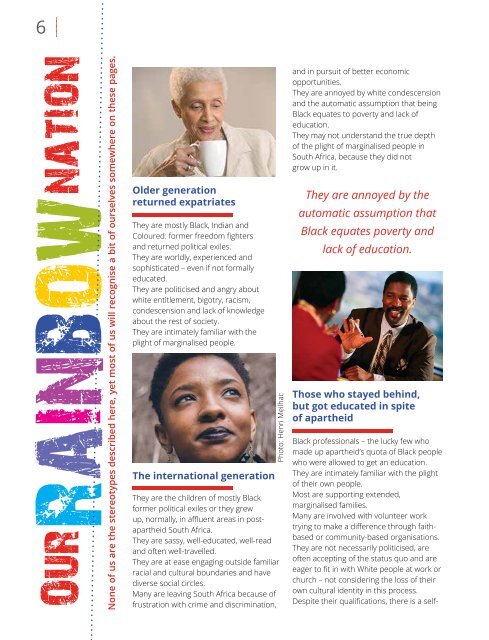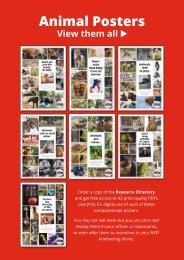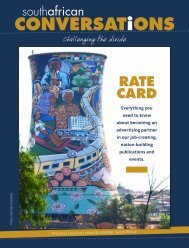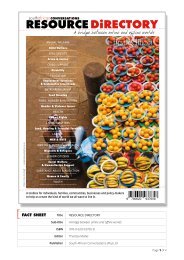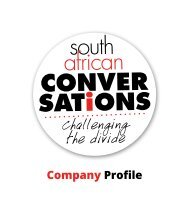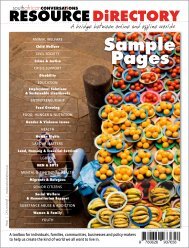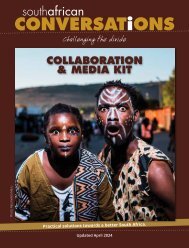South African Conversations sample articles
Insight into who we are as a people. Empowering, practical information. A platform for people who are otherwise voiceless. Suggestions for action by individuals, families, concerned onlookers, businesses and policy-makers to help create a better world for all of us. The South African Conversations magazine is a source of practical, solutions-oriented information. It empowers individuals, families and communities, raises awareness about the lived reality of people who are marginalised, and suggests options for action by concerned onlookers, businesses and policy-makers. The magazine is for sale exclusively by unemployed people who earn 50% of the cover price. Our distribution network is through NPOs across South Africa. These Distribution Hubs earn 17% of the cover price for supplying magazines to sellers and negotiating safe sales spaces for them in places with high levels of affluent foot traffic. Enjoy these sample articles and look for opportunities sprinkled throughout to collaborate with us.
Insight into who we are as a people. Empowering, practical information. A platform for people who are otherwise voiceless. Suggestions for action by individuals, families, concerned onlookers, businesses and policy-makers to help create a better world for all of us.
The South African Conversations magazine is a source of practical, solutions-oriented information. It empowers individuals, families and communities, raises awareness about the lived reality of people who are marginalised, and suggests options for action by concerned onlookers, businesses and policy-makers.
The magazine is for sale exclusively by unemployed people who earn 50% of the cover price. Our distribution network is through NPOs across South Africa. These Distribution Hubs earn 17% of the cover price for supplying magazines to sellers and negotiating safe sales spaces for them in places with high levels of affluent foot traffic.
Enjoy these sample articles and look for opportunities sprinkled throughout to collaborate with us.
Create successful ePaper yourself
Turn your PDF publications into a flip-book with our unique Google optimized e-Paper software.
6<br />
Our nation<br />
rainbow<br />
None of us are the stereotypes described here, yet most of us will recognise a bit of ourselves somewhere on these pages.<br />
Older generation<br />
returned expatriates<br />
They are mostly Black, Indian and<br />
Coloured: former freedom fighters<br />
and returned political exiles.<br />
They are worldly, experienced and<br />
sophisticated – even if not formally<br />
educated.<br />
They are politicised and angry about<br />
white entitlement, bigotry, racism,<br />
condescension and lack of knowledge<br />
about the rest of society.<br />
They are intimately familiar with the<br />
plight of marginalised people.<br />
The international generation<br />
They are the children of mostly Black<br />
former political exiles or they grew<br />
up, normally, in affluent areas in postapartheid<br />
<strong>South</strong> Africa.<br />
They are sassy, well-educated, well-read<br />
and often well-travelled.<br />
They are at ease engaging outside familiar<br />
racial and cultural boundaries and have<br />
diverse social circles.<br />
Many are leaving <strong>South</strong> Africa because of<br />
frustration with crime and discrimination,<br />
Photo: Henri Meilhac<br />
and in pursuit of better economic<br />
opportunities.<br />
They are annoyed by white condescension<br />
and the automatic assumption that being<br />
Black equates to poverty and lack of<br />
education.<br />
They may not understand the true depth<br />
of the plight of marginalised people in<br />
<strong>South</strong> Africa, because they did not<br />
grow up in it.<br />
They are annoyed by the<br />
automatic assumption that<br />
Black equates poverty and<br />
lack of education.<br />
Those who stayed behind,<br />
but got educated in spite<br />
of apartheid<br />
Black professionals – the lucky few who<br />
made up apartheid’s quota of Black people<br />
who were allowed to get an education.<br />
They are intimately familiar with the plight<br />
of their own people.<br />
Most are supporting extended,<br />
marginalised families.<br />
Many are involved with volunteer work<br />
trying to make a difference through faithbased<br />
or community-based organisations.<br />
They are not necessarily politicised, are<br />
often accepting of the status quo and are<br />
eager to fit in with White people at work or<br />
church – not considering the loss of their<br />
own cultural identity in this process.<br />
Despite their qualifications, there is a self-


